Tell us about how you got into wine and why you wanted to follow a career in wine?
After finishing university, I started a career in the banking industry in Poland.But I realised early on that this type of job wasn’t bringing me any fulfilment. I wanted to follow a career path, where I could meet a lot of interesting people, stay connected with nature, but also satisfy my craving for travelling, trying different wines and food, and learning about different cultures through that. I wanted the luxury of every workday being different.
Working as a sommelier ticked all those boxes. I had always admired sommeliers and front of house teams as a guest in restaurants and thought I could try to become a professional too. It helped that, early on in London, I met wonderful people in the industry like Laure Patry, who mentored me through the change.
What was your initial training to be a sommelier?
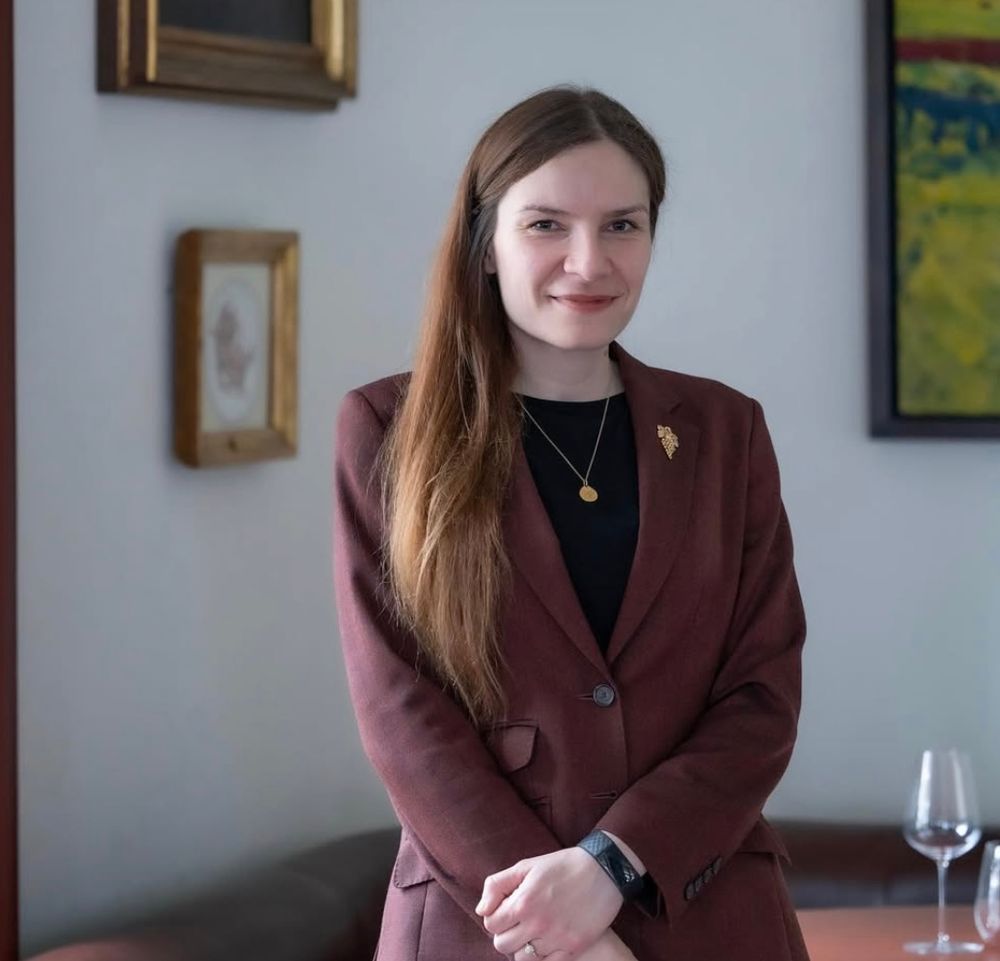
Agnieszka Swiecka Master Sommelier is head of wine for the Audley & Mount St Restaurant by Artfarm
I moved to UK to pursue sommelier studies and started my education with WSET, reaching Level 3 Advanced certification.
I really enjoyed it, but wanted to take complementary courses that would focus more on details like producer knowledge, vintage differences, under the radar wine regions, the art of wine and restaurant service and business skills focused on the restaurant environment. The Court of Master Sommeliers Europe was the perfect choice for this.
I passed my Advanced in 2019 and had my first attempt at the MS (Master Sommelier) exam in October 2023. I became a Master Sommelier in June 2025.
I believe in always trying different things , so I have also taken the ASI (Association De la Sommellerie Internationale) examination, and I am a holder of the ASI Gold Diploma.
I try to enhance my knowledge by regularly travelling to wine regions, talking to winemakers, participating in supplier tastings, attending wine fairs, and joining study groups with my peers.
What has been your career to date as a sommelier - key steps along the way?
I started as a commis sommelier and worked my way up to head sommelier and buyer positions in fine dining restaurants. I currently work as head of wine at Artfarm’s Mount St Restaurant and the Audley in Mayfair, London.
The venue consists of different outlets with different concepts - fine dining restaurant, pub and four private dining room spaces. All beautifully decorated with art curated by Hauser & Wirth.
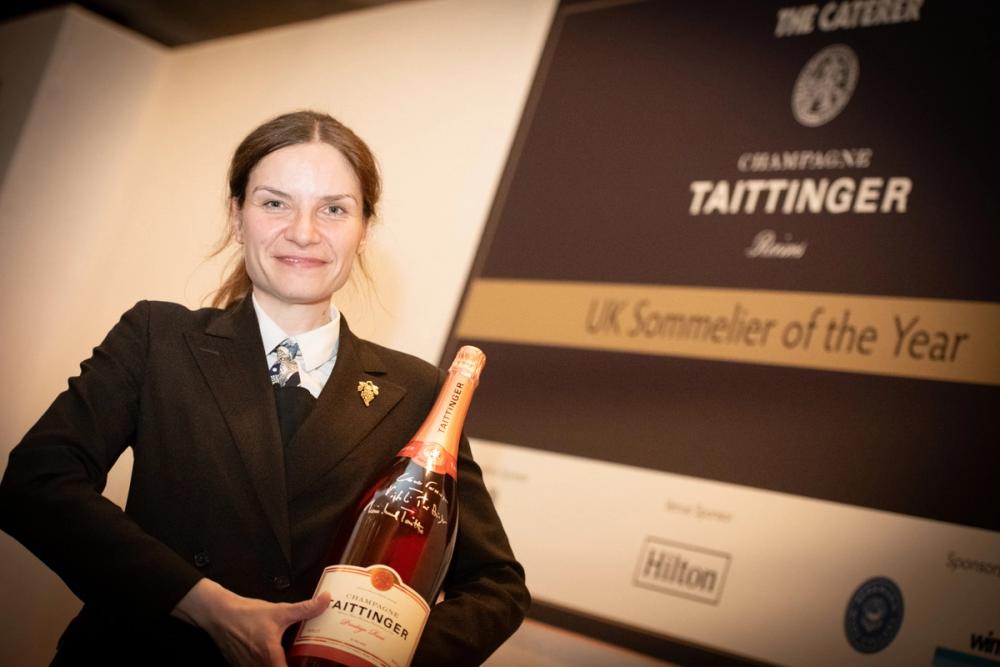
Agnieszka Swiecka MS was the UK Sommelier of the Year in 2023
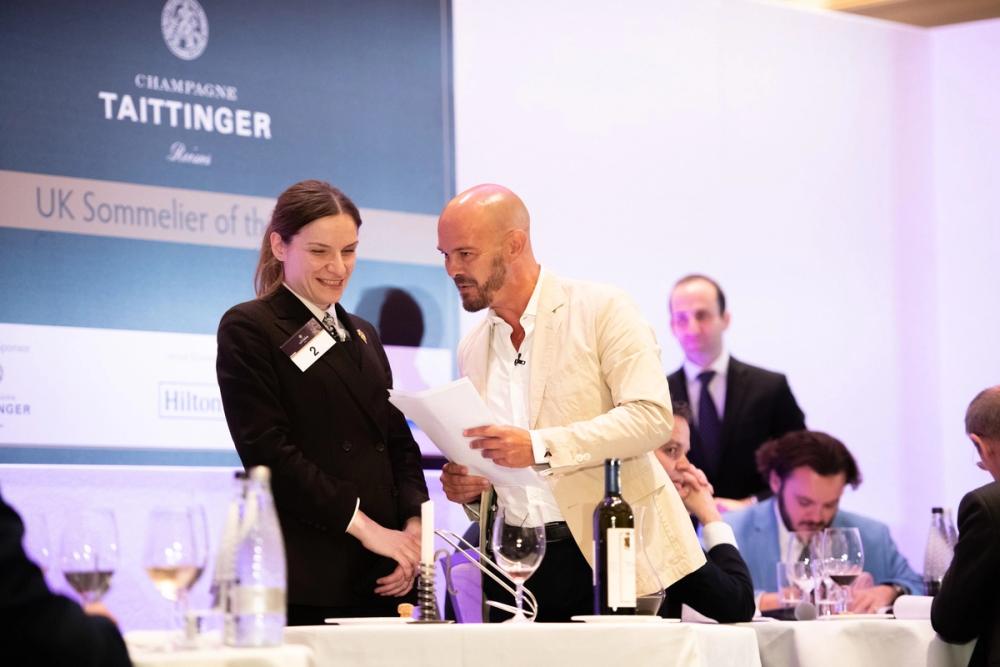
One of the key steps in my career was deciding to participate in sommelier competitions. It was a great honour and a milestone in my career, to win the 2023 UK Sommelier of the Year.
Apart from the “day job”, I am involved in wine judging as well as judging sommelier competitions likeChaîne des Rôtisseurs UK Young Sommelier of the Year and IWSC UK Sommelier of The Year.
I also teach WSET level 2 in my company.
My next goal is to teach Court of Master Sommelier courses. Two Master Sommeliers I admire greatly, Ronan (Sayburn)and Brian (Julyan ), once told me that passing MS exams is an end of one journey but also a beginning of another one, maybe even a more important and enriching one – mentoring.
I had so many Master Sommeliers and MS candidates help me during my preparations and I can’t wait to give my time and energy back and foster that community spirit.
What do you enjoy most about being a sommelier?
Conversations with guests and enhancing their experience, visiting wine regions, and talking to winemakers. The adrenaline of busy service. The active lifestyle and the thrill of every day being different. The fact that it is the profession where you can have a lifetime learner mindset. And all the good wine and food I get to try.
Why do you want to train to be a Master Sommelier?
I like a challenge, and I am always keen to learn new things. Having a goal like that helped me to stay disciplined.
What was the process like in terms of the difficulty and the time and dedication you need to put into the programme?
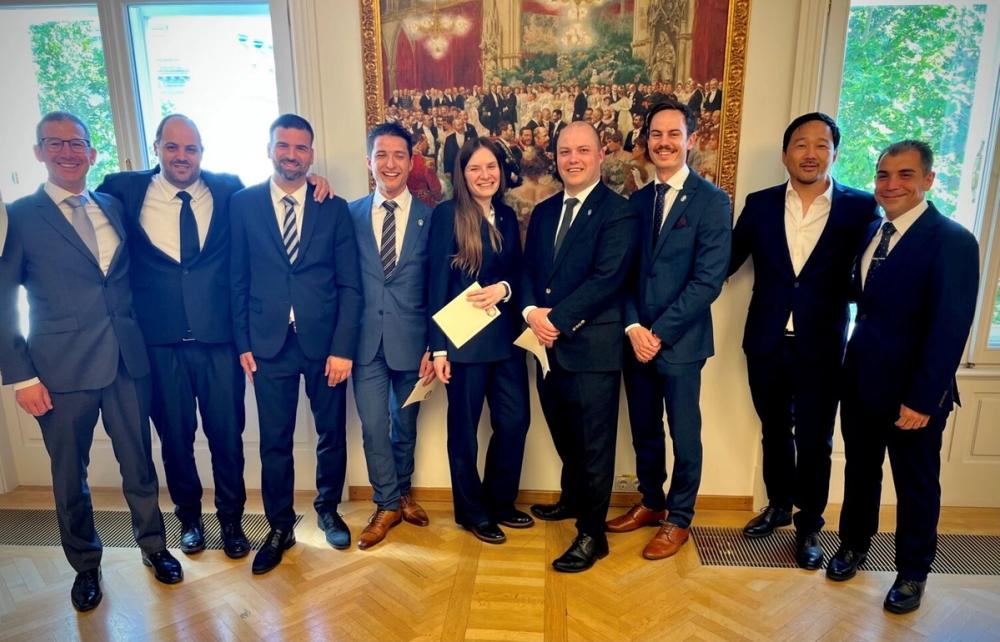
Agnieszka Swiecka and the other new Master Sommeliers in 2025
The process is challenging and, it takes a lot of time and resilience. Yet I am very grateful to Court of Master Sommeliers for what they do, and how they do it. They're giving their students a competitive advantage, by not allowing them to settle for mediocre or average. Each step on the way from Intro to Master Sommelier is earned through diligence, hard work, and dedication - not by simply paying the money, showing up for class, doing little or nothing, and not really learning.
There is huge satisfaction with each pin gained, and the sense that hard work and commitment pay off. There is a lot of self-studies involved, but at the same time, there is a wonderful community, mentoring and great resources available to the candidates.
As Dr John Terry says, when you lower the standards, so everyone is equal, you're not challenging anyone to stretch themselves, become a better version of themselves, and strive for excellence. You're simply becoming a belt factory rather than rewarding the students who do the work.
With CMS you don’t get a participation medal for just showing up, but you will learn so much, and not only about the sommelier craft. I personally developed skills and resilience that can be applied in different type of jobs or life situations.
What have you enjoyed the most about the training and education side of becoming a MS?
I love the community that CMS fosters and the spirt of camaraderie. It’s exciting to meet and exchange advice with sommeliers from all over the world, united by pursuing the same goal.
At the same time 75% of my study strategy was to just do it by myself. It gave me the chance to know and understand myself better. For me, getting the MS diploma was as much about character building, as it was about perfecting wine knowledge, tasting, business and service skills.
I also love blind tastings, whether I do well or not so well, it’s always so much fun. This aspect was always my favourite part of the training.
What did you find the most difficult and how do you manage to get over those difficulties?
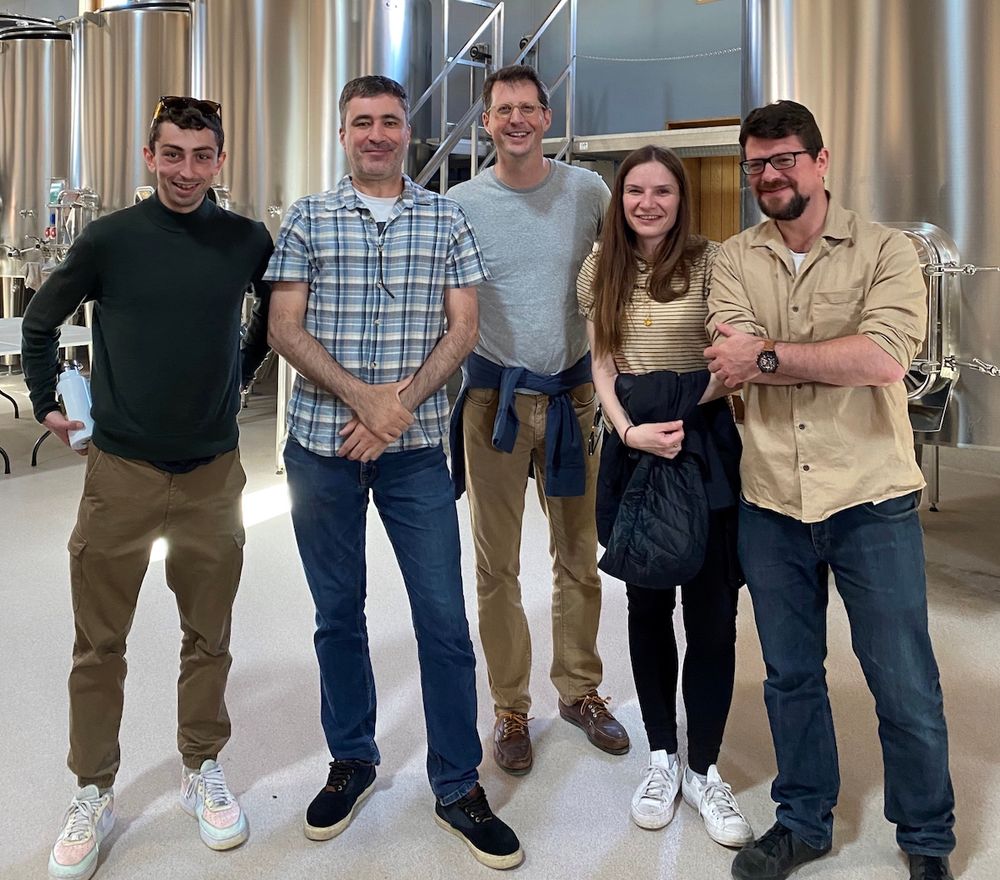
Agnieszka Swiecka and the team from Mount Street Restaurant at Domaine Dujac in Burgundy
The most difficult part was to get into the right mindset. The biggest fight on this journey happens in your head. Whether it’s overthinking during blind tasting rather than just following the tasting grid, or trying to second guess the questions that may appear during theory exam, your mind will try to play tricks on you.
I was fortunate to pass the blind tasting and practical parts of the MS exam at my first attempt in 2023, but the theory was my achilles heel. I have created self-limiting beliefs in my head that hindered my chances to pass. For example, I was telling myself that, to pass the exam I don’t need to have a deep knowledge of spirits and cocktails, as this is a sommelier not a bartender certification. It wouldn’t be fair to ask too many spirits questions.
Or things along the lines - if last year there were questions about Chile maybe it’s better to focus on Argentina for this year’s exam? Can I skip studying about Bulgaria? It’s likely that I will get one question if any, and I need 75% to pass. You get the idea.
I was looking for the magical formula to pass, rather than just trying to get the best out of the journey and focus on becoming the best version of a sommelier that I can be. I am forever grateful for not passing the theory exam at my first or second attempt, as succeeding would validate this kind of mindset.
After failing twice I decided that to get better results, I needed to change the way I think and study. This was my eureka moment. I decided to focus on small steps and just aiming to become a little better every day. Not trying to outsmart the system – just studying to the best of my abilities and letting go of the outcome. I tried to have a realistic study schedule. Break bigger subjects into smaller blocks and be consistent with the hours I put in, not beating myself up when I fell behind the study schedule but also not making excuses.
I am happy to report that I passed at my third attempt in 2025 and that I can now cover the bartender shift at work if needed, as I didn’t skip cocktails and spirits section this time.
What advice would you give to other sommeliers who want to train to be a MS - what are the key things they need to consider?
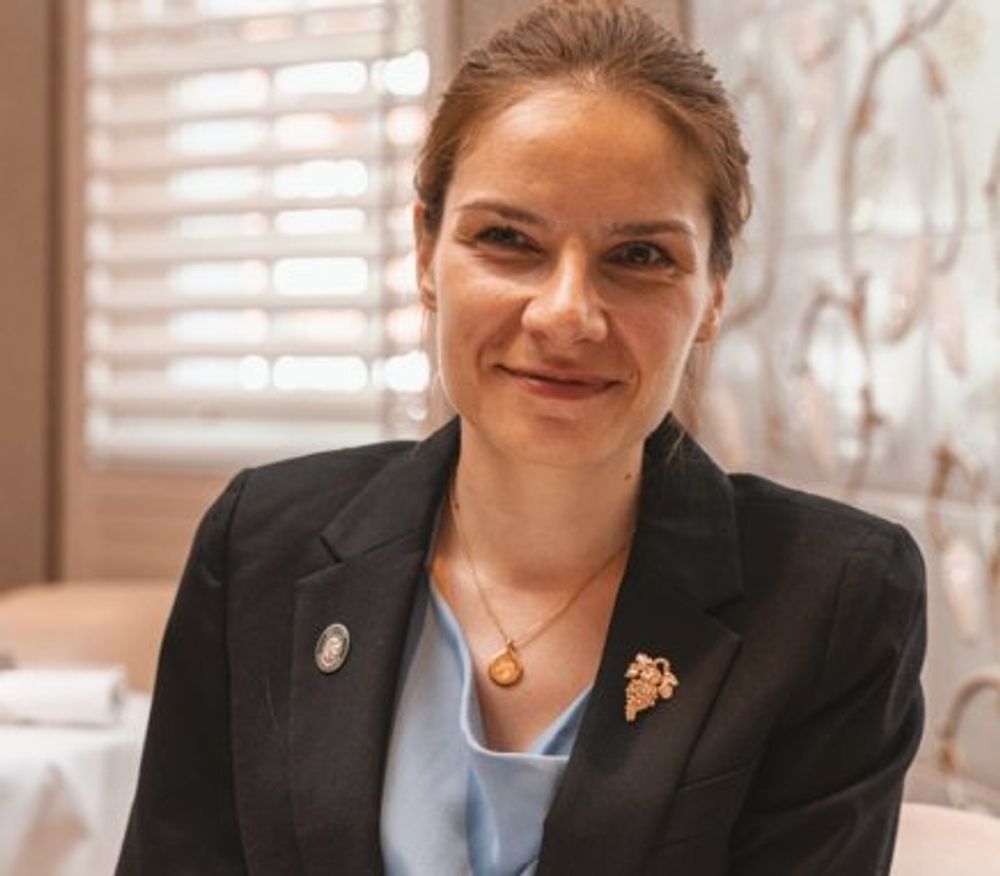
Agnieszka Swiecka MS is keen to help future Master Sommeliers through mentoring and helping to judge events such as the IWSC's UK Sommelier of the Year
I would say, it’s best to have a lifetime learner approach, stay curious, consistent and believe in the process.
Be humble in winning, and gracious in losing, and learn the lessons both are trying to teach you. Positive thinking and discipline are the key. Consider surrounding yourself with like-minded people.
Strive to become better today than you were yesterday and repeat that process day after day.
Is it helping with your career and your job opportunities?
The MS Diploma opens a lot of doors. I was fortunate to already have great job with most wonderful and supportive team around me. Me passing this exam was our collective success - I wouldn’t be able to do it without them. However, I was flattered to receive a lot of job offers from all over the word and also requests for consultancies.
For me becoming an MS can help to diversify what you do and create different streams of income as well as different creative challenges and side projects.
What are your ambitions now as a sommelier and where you want to work?
I want to give back to the community and help teach CMS courses as well as offer support and mentoring to sommeliers on this journey.
Apart from that, my ambition is still the same – to strive to become better today than I was yesterday and have fun along the way.
* To find out more about the Court of Master Sommeliers and how to take part in its courses click here.






























